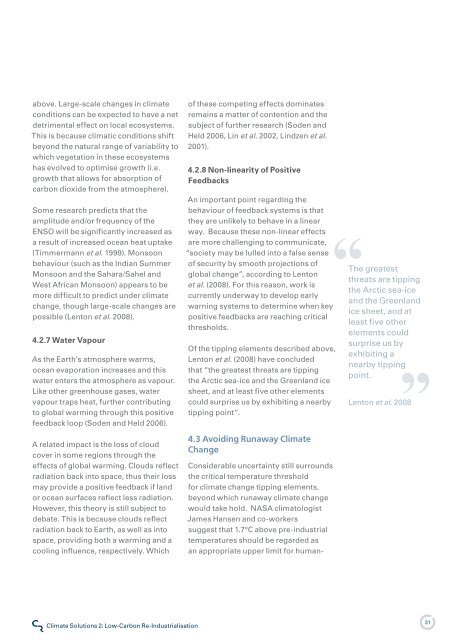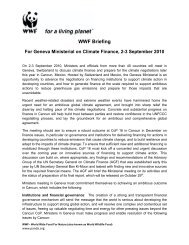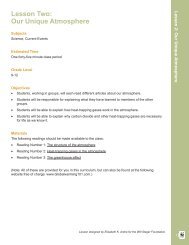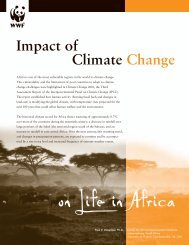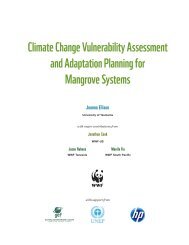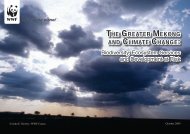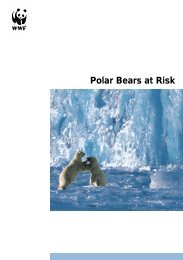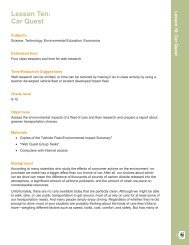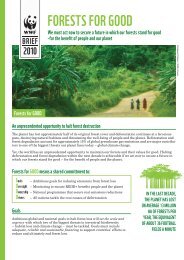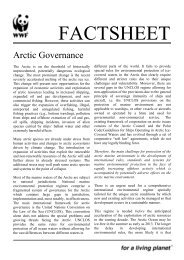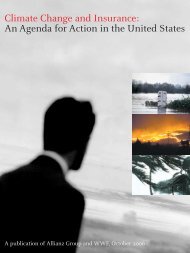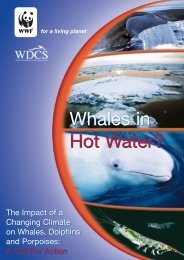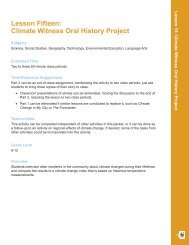Climate Solutions 2: Low-Carbon Re-Industrialisation - WWF Blogs
Climate Solutions 2: Low-Carbon Re-Industrialisation - WWF Blogs
Climate Solutions 2: Low-Carbon Re-Industrialisation - WWF Blogs
Create successful ePaper yourself
Turn your PDF publications into a flip-book with our unique Google optimized e-Paper software.
above. Large-scale changes in climate<br />
conditions can be expected to have a net<br />
detrimental effect on local ecosystems.<br />
This is because climatic conditions shift<br />
beyond the natural range of variability to<br />
which vegetation in these ecosystems<br />
has evolved to optimise growth (i.e.<br />
growth that allows for absorption of<br />
carbon dioxide from the atmosphere).<br />
Some research predicts that the<br />
amplitude and/or frequency of the<br />
ENSO will be significantly increased as<br />
a result of increased ocean heat uptake<br />
(Timmermann et al. 1999). Monsoon<br />
behaviour (such as the Indian Summer<br />
Monsoon and the Sahara/Sahel and<br />
West African Monsoon) appears to be<br />
more difficult to predict under climate<br />
change, though large-scale changes are<br />
possible (Lenton et al. 2008).<br />
4.2.7 Water Vapour<br />
As the Earth’s atmosphere warms,<br />
ocean evaporation increases and this<br />
water enters the atmosphere as vapour.<br />
Like other greenhouse gases, water<br />
vapour traps heat, further contributing<br />
to global warming through this positive<br />
feedback loop (Soden and Held 2006).<br />
A related impact is the loss of cloud<br />
cover in some regions through the<br />
effects of global warming. Clouds reflect<br />
radiation back into space, thus their loss<br />
may provide a positive feedback if land<br />
or ocean surfaces reflect less radiation.<br />
However, this theory is still subject to<br />
debate. This is because clouds reflect<br />
radiation back to Earth, as well as into<br />
space, providing both a warming and a<br />
cooling influence, respectively. Which<br />
of these competing effects dominates<br />
remains a matter of contention and the<br />
subject of further research (Soden and<br />
Held 2006, Lin et al. 2002, Lindzen et al.<br />
2001).<br />
4.2.8 Non-linearity of Positive<br />
Feedbacks<br />
An important point regarding the<br />
behaviour of feedback systems is that<br />
they are unlikely to behave in a linear<br />
way. Because these non-linear effects<br />
are more challenging to communicate,<br />
“society may be lulled into a false sense<br />
of security by smooth projections of<br />
global change”, according to Lenton<br />
et al. (2008). For this reason, work is<br />
currently underway to develop early<br />
warning systems to determine when key<br />
positive feedbacks are reaching critical<br />
thresholds.<br />
Of the tipping elements described above,<br />
Lenton et al. (2008) have concluded<br />
that “the greatest threats are tipping<br />
the Arctic sea-ice and the Greenland ice<br />
sheet, and at least five other elements<br />
could surprise us by exhibiting a nearby<br />
tipping point”.<br />
4.3 Avoiding Runaway <strong>Climate</strong><br />
Change<br />
Considerable uncertainty still surrounds<br />
the critical temperature threshold<br />
for climate change tipping elements,<br />
beyond which runaway climate change<br />
would take hold. NASA climatologist<br />
James Hansen and co-workers<br />
suggest that 1.7°C above pre-industrial<br />
temperatures should be regarded as<br />
an appropriate upper limit for human-<br />
The greatest<br />
threats are tipping<br />
the Arctic sea-ice<br />
and the Greenland<br />
ice sheet, and at<br />
least five other<br />
elements could<br />
surprise us by<br />
exhibiting a<br />
nearby tipping<br />
point.<br />
Lenton et al. 2008<br />
<strong>Climate</strong> <strong>Solutions</strong> 2: <strong>Low</strong>-<strong>Carbon</strong> <strong>Re</strong>-<strong>Industrialisation</strong><br />
31<br />
<strong>Climate</strong> Risk


